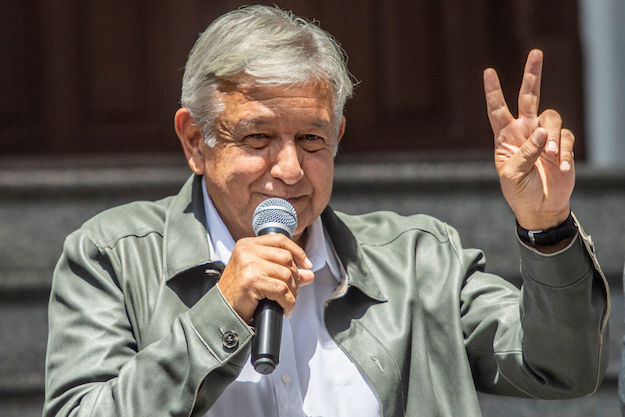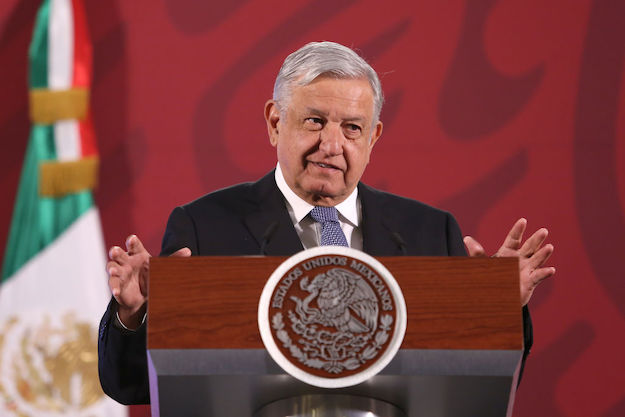Subscribe here to receive the AMLO Update by email
Highlight of the Week
In its first week in control of Congress, Andrés Manuel López Obrador’s Morena party tightened its grip on power, negotiating its way to an absolute majority in the lower house and locking up key leadership positions.
The maneuver was highly controversial. Thanks to an intervention by Morena senators, Green Party (PVEM) senator Manuel Velasco was allowed to temporarily return to his previous job as governor of Chiapas despite norms prohibiting officials from holding two elected offices at once. At around the same time, five PVEM legislators, with support from their leadership, switched parties to Morena in the Chamber of Deputies.
The timing prompted accusations of a quid pro quo, although analysts told AQ the switch was more likely part of a broad arrangement between the two parties. Morena’s absolute majority in the lower house means the party will occupy the presidency of the chamber’s Junta de Coordinación Política for the next three years. Gustavo Almaraz, executive director of Grupo Estrategia Política, a consultancy, described the junta as “the heart of the Congress” and essential to setting legislative priorities.
“(The move of the five senators) gives Morena practically absolute control of the agenda,” Almaraz told AQ.
What they’re saying: Salvador Camarena on Manuel Velasco’s spotty record in Chiapas; a breakdown of the changes in Congress from Político.mx; Lisa Sánchez and Alexandra Zapata discuss Morena’s controversial start with Carlos Puig on Milenio TV.
What Will He Do on Energy?
Public statements from López Obrador on Thursday highlighted uncertainty around the incoming administration’s energy agenda.
Ahead of a meeting with oil executives on Saturday, López Obrador said his government would offer tenders for oil drilling projects within days of inauguration. One oil executive told the Financial Times that the announcement was “good news for Mexico,” despite a lack of detail.
But analysts pointed out that López Obrador seemed to be referring to service contracts, rather than bid rounds on new oil and gas projects. Incoming administration officials have sent mixed signals in recent weeks over the fate of oil auctions tied to Mexico’s 2013 energy opening.
The statement came two days after López Obrador said that planning for the construction of a new $8 billion oil refinery, which some observers believe is economically unviable, would begin in December. The president-elect says his priority is to increase Mexican crude production, which has fallen by nearly 50 percent since 2004.
What they’re saying: Amy Stillman in Bloomberg on the struggles at Pemex; Lisa Viscidi and Nate Graham on how López Obrador could turn Mexico into a global clean energy leader; a look at AMLO’s energy team.
Briefs
The Senate controversy on Tuesday drew attention away from Morena’s first legislative initiatives, which included a proposal to expand public health benefits for same-sex couples and another to rein in Senate privileges.
López Obrador tapped Santiago Nieto to head the Treasury Department’s financial intelligence unit. Nieto last year was removed from office as attorney general for electoral crimes while investigating Odebrecht-related corruption allegations against a close associate of President Enrique Peña Nieto.
New technical studies put a dent in López Obrador’s proposal for an alternative to Mexico City’s new airport project, which is currently under construction.
Juan Pardinas of the Mexican Institute for Competitiveness (IMCO) called AMLO’s plan to hold the airport project up to a public consultation “like asking Mexicans whether or not they want to shoot the economy in the foot.”
Quote of the Week
“I’m not going to talk about that, corazoncitos.”
López Obrador landed in hot water when he told a group of female reporters that he wouldn’t comment on Velasco’s temporary recusal from the Senate. Corazoncitos, a term of endearment, literally means “little hearts.”
—
Russell is AQ’s correspondent in Mexico City








